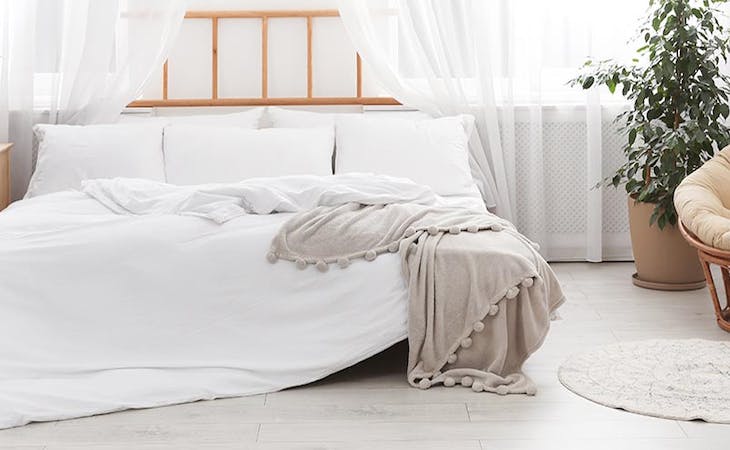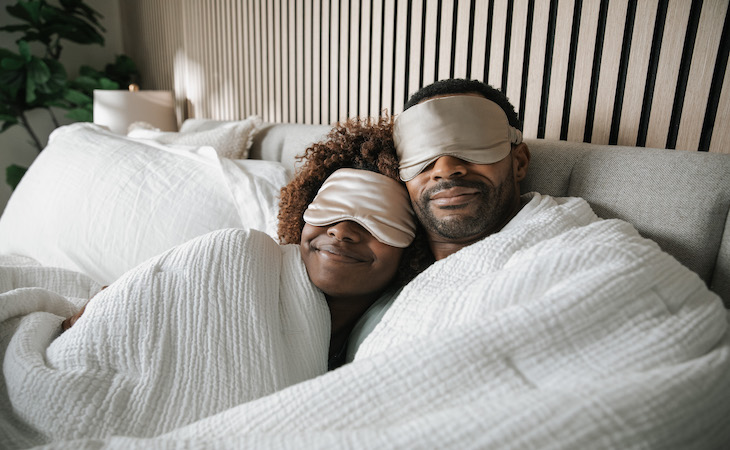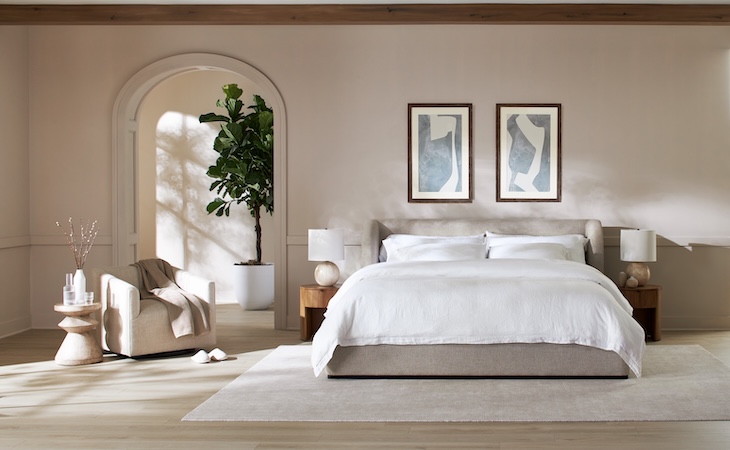Whether or not you’re aware of it, the way your bedroom looks has a significant impact on the quality of your sleep. Painting your bedroom walls a soothing shade of blue, for example, can promote relaxation and make falling asleep easier. So can making your bed every morning, since seeing disarray when you walk through the door is often stressful and less than conducive to preparing for a good night’s sleep.
So it makes sense, then, that proponents of the ancient Chinese tradition of feng shui—a practice based on the notion that the layout of your home plays a big role in your health and wellbeing—say the right bedroom layout can improve the quality of your sleep. Here, learn more about the art of feng shui and how to use the principles of this practice to create a feng shui bedroom.
What is feng shui?
Feng shui began more than 3,000 years ago in ancient China—translated, it literally means wind (feng) water (shui). Since wind and water are both linked to good health in Chinese culture, good feng shui signifies good fortune (and vice versa). Feng shui contains elements of many different branches of study, including physics, philosophy, and astrology.
“Feng shui is concerned with the impact of the environment on human life,” explains Laura Cerrano, feng shui expert in New York City and Los Angeles. It’s the art of placement and understanding how the arrangement of objects in a space affects its inhabitants.
The purpose of feng shui is to create harmony between your energy and the energy within your surroundings. You can practice feng shui by thinking carefully about what objects you bring into your home, how you arrange them, and even how you take care of your space. “If someone isn’t taking care of their house—which is supposed to be a sanctuary—then what is happening within themselves?” Cerrano asks.
How to create a feng shui bedroom for better sleep
While the benefits of feng shui haven’t been scientifically proven—yet, notes Cerrano—taking steps to think mindfully about your living space can still have a positive effect. Here are her expert tips for designing a feng shui bedroom for more peaceful sleep.
Consider the room’s purpose
The first step to better bedroom feng shui is to ask what the function of the space is, suggests Cerrano. “Your bedroom is supposed to be a place of tranquility, not stress,” she says.
That’s easier to do when your bedroom is completely separate from the other rooms in your house. But what if you live in a studio apartment where your bedroom is in the middle of your living room and doubles as your office?
In that case, she says, think about how you can section off a part of the room for sleep. A couple of things you can do: Put an area rug under the bed and place nightstands on either side to create boundaries. (This is the best direction to sleep in, per feng shui principles.)
Declutter
“Clutter usually hides in your bedroom,” says Cerrano. And that clutter often represents negative thoughts that can hinder sleep. “We tend to suppress our subconscious thoughts,” she says, “and hide them under our bed, in our armoire, or in our closet.”
So the next step in creating a feng shui bedroom would be to tidy up your sleep space. Cerrano explains that every object has an energy, and this energy can be beneficial or draining depending on the object.
If that teddy bear an ex-beau gave you is tucked somewhere under your bed, for example, Cerrano recommends removing it from your bedroom to help improve the feng shui. (Here’s how to create a mindful bedroom, according to a feng shui expert.)
Choose relaxing feng shui colors
Certain hues are more beneficial for sleep than others in a feng shui bedroom, so paint your bedroom walls accordingly. While it’s important to surround yourself with colors you like, many of Cerrano’s clients choose earth tones, creams, beiges, and neutrals in the space where they sleep.
Set your bed up for sleep success
A good night’s sleep starts with the right bed. Your mattress should be a reasonable height off the ground so that energy can flow throughout the space, Cerrano says. If you need to use under-bed storage, only stash neutral items that won’t negatively affect your mood, like extra clothing and bedsheets.
Next, choose a headboard that’s supportive and comfortable. Cerrano likes wood headboards because according to the principles of feng shui wood has a “gentle energy” that will help support your sleep journey.
For the optimal feng shui bedroom layout, your bed should rest against a solid wall—ideally the one farthest from the door. Cerrano recommends keeping a clear view of the door and leaving it open while you sleep because doors are portals through which good energy and communication flow.
For that reason, she says, you’ll want to keep yours in good shape. According to feng shui principles, if the door has chipped paint or hardware that’s falling off, that could be a sign that you’re not really listening to your partner—and that you’re not really paying attention to your home.
Balance “yin” and “yang” elements
Every object has a yin (female) or yang (male) energy, and one of the most important aspects of feng shui is balancing the two. Ask yourself: “Does the space feel warm, inviting, and nurturing (yin) or cold and hard (yang)?” says Cerrano.
Hardwood floors have a very “yang” energy, so balance that out with softer elements, like curtains and window treatments.
Get rid of electronics
“Don’t allow the habit of adopting electronics in the bedroom to become the norm,” says Cerrano. Modern science supports her: The blue light emitted by phones, TVs, and laptops can lead to sleep deprivation and insomnia. (Does your phone double as your alarm clock? Here’s how to wake up without an alarm.)
If you insist on having a TV in your bedroom, make sure it’s 4 to 5 feet away from your bed. Cerrano points to a field of science called building biology, which studies the health effects of electromagnetic frequencies from devices on humans. The farther your TV is from you, the less impact these frequencies will have on you.
Open the windows
The final step in good bedroom feng shui: Crack open a window to let air flow through the room. “Having fresh air circulating is amazing,” Cerrano says.
Sleep in a teeny-tiny bedroom? Here’s how to make a small bedroom look bigger.




